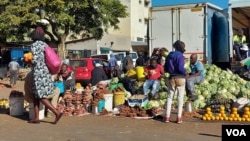Kudzayi Zvinavashe
HARARE - With the value of Zimbabwe’s currency falling dramatically by the day, prices are rising and markets are demanding US Dollars for goods and services. That’s putting pressure on the government to restore stability – and what one official called “sanity” – to the situation.
The price hikes are coming with elections due in a few months. Consumers have had their local currency value eroded, with an increasing number of basic goods now beyond their reach.
Innocent Mhiko is a Harare resident. “As customers, we note the wholesalers and retailers raise basic commodity prices, which corresponds to the black market rate. The truth of the matter is that there is no confidence in the local currency, the majority of local wholesalers and retailers now choose to price their items in US dollars rather than unwanted local currencies.”
The free-fall of the local currency has left many who earn their wages in the currency vulnerable.
Obert Masaure is the president of the Amalgamated Rural Teachers Union of Zimbabwe. He says teachers and civil servants are among those left vulnerable.
“Teachers are earning their basic salary in the local currency, they’re earning their housing allowance in the local currency, their transport allowance in the local currency, even their own pension contributions in local currency. What that means, when the local currency has collapsed like it has done now, they will now be reduced to paupers. It is now almost criminal for the government to continue paying teachers in RTGS. We urge the government to urgently pay all salaries in United States dollar terms. It's a mockery for someone to be earning something like 80 000 RTGS.”
Eighty thousand RTGS is equivalent to just over 34 United States dollars using today’s black market rate. As of Friday, US$1 was officially pegged at ZWL$1,116.75 while it fetched ZWL$2,350 on the black market. The collapse of the Zimbabwe dollar has forced many locals to live from hand to mout.
The situation puts the ruling Zanu PF under pressure with elections looming. Monica Mutsvangwa is the minister of information.
“The nation is being informed that Cabinet is concerned by the spiraling prices of the 14 basic goods, especially bread, flour, cooking oil and mealie-meal. The Minister of Industry and Commerce is already engaging the concerned stakeholders – including manufacturers, wholesalers, retailers and other associations – on the matter. Given the urgency of the matter, Cabinet has set up a Committee to quickly investigate, monitor and make appropriate recommendations to Cabinet with a view to bringing sanity to the situation.”
The government has opened the borders for free importation of basic goods and assured the public that more measures are coming to ease the situation.
In June last year when inflation doubled and the government introduced gold coins, which the central bank claimed would be a store of value and were expected to reduce the demand for the United States dollar. But the local currency has tumbled in the past few months, resulting in the Reserve Bank of Zimbabwe to reintroduce so-called gold-backed digital tokens.
In 2009, Zimbabwe abandoned its local currency after it re-denominated it at least three times. In 2008, the country introduced a ZWL$100 billion note after it was ravaged by hyperinflation. Pensioners lost their savings and prices skyrocketed, resulting in the introduction of the United States dollar the following year. The southern African nation reintroduced the Zimbabwe currency soon after President Emmerson Mnangagwa toppled the later former President Robert Mugabe in a defacto military coup.




